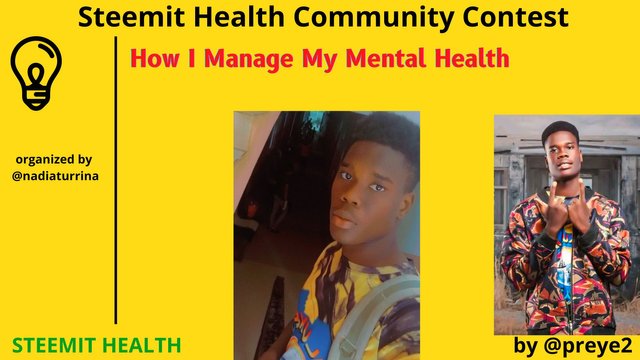Steemit Health Contest #11: How I Manage My Mental Health
Hello Friends, |
|---|

Designed on Canva
Mental health is an important part of our overall well-being, yet there are still many misconceptions and misunderstandings about it. From its effects on our daily lives to the way it can be managed and treated, mental health is a topic that deserves greater attention.
I will be sharing my views and understanding of the topic of discussion (Mental Health). With this knowledge, we can all better understand mental health and how to provide support for those in need.
What I Understand By Mental Health |
|---|
Mental health is the overall well-being of the intellectual sector of our minds. It usually refers to some disorders and trauma that causes stress to our minds and brain.
Mental illness affects people of all ages, genders, races, and socioeconomic backgrounds. It is estimated that nearly one in five adults in the United States experiences a mental illness in a given year, and that’s over 44 million people.
Mental illness is not just an individual experience, it can also have an impact on families and communities.
The effects of mental illness can be far-reaching and long-lasting. It can have a major impact on an individual’s ability to function in their everyday life. It can interfere with relationships, work, school, and other areas of life.
Mental illness is not only devastating to an individual's quality of life, but it can also be costly in many ways. According to the National Alliance on Mental Illness, mental illness costs the US economy up to $193 billion each year in lost earnings. This figure includes the cost of hospitalization, medication, therapy, support programs, and lost opportunities due to decreased productivity.
Mental illnesses can manifest as depression, anxiety, schizophrenia, or eating disorders. It’s important to remember that mental illness is common and not an isolated experience. Everyone deserves support and understanding when dealing with mental health challenges.
The Causes Of This Mental Disorder |
|---|
It is also important to keep in mind that mental illnesses are medical conditions just like any other medical condition. They can be managed through proper diagnosis and treatment. No one chooses to develop a mental illness; it is not something that someone can just “get out of.” It is not caused by a lack of willpower or moral strength.
They often result from a combination of biological, psychological, and environmental factors. Factors such as trauma, stress, abuse, genetics, brain chemistry, substance use, and family history can all contribute to the development of mental health disorders.
If you think you or someone you know is suffering from a mental health condition, reach out for help from a qualified professional. It is the first step towards getting back on the path to recovery and good mental health.
Mental illness can have a wide variety of effects on physical health, and it is not uncommon for it to co-occur with other chronic diseases. Conditions such as diabetes, heart disease, and cancer are all associated with higher rates of mental illness.
Mental health problems can make it more difficult to manage these conditions, as the person may struggle with self-care, treatment adherence, and regular appointments. It is also common for people with mental illness to experience greater physical pain or fatigue, which can lead to further health problems.
How I Manage My Mental Health |
|---|
Mental health is an important part of our overall well-being and should be cared for just as we care for our physical health. Mental health issues such as depression, anxiety, and stress can have a significant impact on our lives and should not be ignored. Fortunately, there are some simple, effective strategies that can help us manage our mental health.
 | .jpg) |
|---|---|
One of the major reasons why I find this contest really interesting is that I have personally gone through mental stress on so many occasions, even to the extent of going to the hospital for help. I have been guided on ways to improve my mental health, and I would be sharing them with you my Steemit friends.
Getting enough sleep is essential to managing your mental health. Not getting enough sleep can have a negative impact on your mental health and affect your ability to think and concentrate, as well as your mood. Studies have also shown that lack of sleep can increase the risk of developing depression.
To get the most out of your sleep, it’s important to establish a regular sleep schedule and stick to it. Try to go to bed at the same time each night and get up at the same time each morning. Avoid caffeine, alcohol, and nicotine in the evening, as these can all interfere with your sleep.
Make sure you keep your bedroom dark and quiet and remove any distractions like televisions and phones. If you’re having trouble sleeping, there are a few things you can do to help.
First, try relaxing activities before bed such as reading or taking a warm bath. You could also try exercising regularly during the day or writing down any worries or thoughts that are keeping you up. If these don’t work, talk to your doctor about potential solutions.
Having a balanced diet is essential to maintaining your mental health. Eating nutritious foods like fruits, vegetables, grains, and proteins can help to boost your energy levels, improve your mood, and provide your body and brain with the nutrients it needs.
Make sure to include a variety of foods in your diet, as each food group provides important vitamins and minerals that are beneficial for your overall well-being. Additionally, try to avoid foods with added sugars, saturated fats, and processed ingredients as they can cause your mood to fluctuate.
When it comes to managing your mental health, taking breaks is a crucial part of the equation. It’s easy to get caught up in our daily routines and forget to give ourselves the time we need to rest and recharge. But it’s important to remember that taking regular breaks is essential for maintaining our mental well-being.
Taking breaks can be as simple as taking a few minutes throughout the day to relax, reflect, and practice mindfulness. This could mean taking a few deep breaths, stretching, or simply taking a few moments to clear your mind.
You can also try listening to calming music, going for a walk, or doing something creative like drawing or writing. Taking breaks is not just about relaxing; it’s also about giving yourself the opportunity to refocus and reset your mindset so that you can go back to whatever task you were working on feeling more energized and focused.
Regular exercise is one of the most important aspects of managing your mental health. Exercise helps to increase your endorphins, which are hormones that are released when you are happy or feeling good. It also helps to reduce stress and anxiety, two of the major causes of mental health issues.
Additionally, exercise can help with self-esteem and provide a sense of accomplishment. There are many ways to get exercise, such as walking, running, cycling, swimming, or any other form of physical activity that you enjoy.
You can also join a gym, take classes, or find other activities that you can do alone or with friends. Make sure to take breaks when you need them and don’t overdo them, as it can actually have a negative effect on your mental health. Exercise should be something that you enjoy doing, not something that you have to force yourself to do.
Mental illness is a treatable disorder and can be managed through therapy, medication, lifestyle changes, or a combination of all three. Treatment plans are tailored to meet the needs of the individual and vary depending on the type and severity of the mental illness.
Therapy can help a person manage their symptoms and learn strategies to cope with their mental illness. Cognitive Behavioral Therapy (CBT) is often used to help people understand their thoughts and feelings, as well as how those thoughts and feelings affect their behaviors. Other types of therapy that are used to treat mental illness include Dialectical Behavior Therapy (DBT) and Acceptance and Commitment Therapy (ACT).
Medication is sometimes prescribed to help manage mental illness symptoms. Antidepressants, antipsychotics, mood stabilizers, and anxiolytics are common types of medication used to treat mental illness. It's important to work closely with a doctor when taking medication for mental illness, as these drugs can have side effects and should be taken under the close supervision of a medical professional.
Conclusion |
|---|
No matter how hopeless it may feel, there is hope for recovery and growth when it comes to mental health. With the right treatment and support, many people with mental health issues can overcome their symptoms and improve their lives. It’s important to remember that mental health is a journey and there are many paths to finding healing and support.
Kudos to @nadiaturrina for organizing this contest, you have delivered an educative and interesting contest for us this week, and am glad I participated in it.
Am inviting @daprado1999, @henry5, and @cryptoloover to check this contest.
Note: All images are original photos of me, taken with my mobile device (Infinx Hot10 play 13M DUAL Camera.
Its awesome to read it. its really good written article.
We support quality posts anywhere and any tags.
Curated by : @petface
Thanks for your lovely time and show of support here dear @petface, I really appreciate ❤️:-)